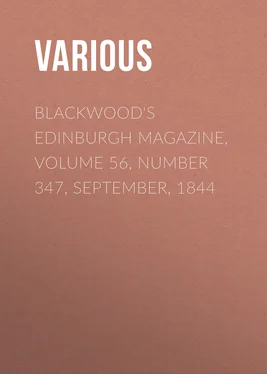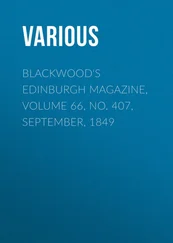Various - Blackwood's Edinburgh Magazine, Volume 56, Number 347, September, 1844
Здесь есть возможность читать онлайн «Various - Blackwood's Edinburgh Magazine, Volume 56, Number 347, September, 1844» — ознакомительный отрывок электронной книги совершенно бесплатно, а после прочтения отрывка купить полную версию. В некоторых случаях можно слушать аудио, скачать через торрент в формате fb2 и присутствует краткое содержание. Издательство: Иностранный паблик, Жанр: foreign_antique, periodic, foreign_edu, на английском языке. Описание произведения, (предисловие) а так же отзывы посетителей доступны на портале библиотеки ЛибКат.
- Название:Blackwood's Edinburgh Magazine, Volume 56, Number 347, September, 1844
- Автор:
- Издательство:Иностранный паблик
- Жанр:
- Год:неизвестен
- ISBN:нет данных
- Рейтинг книги:3 / 5. Голосов: 1
-
Избранное:Добавить в избранное
- Отзывы:
-
Ваша оценка:
- 60
- 1
- 2
- 3
- 4
- 5
Blackwood's Edinburgh Magazine, Volume 56, Number 347, September, 1844: краткое содержание, описание и аннотация
Предлагаем к чтению аннотацию, описание, краткое содержание или предисловие (зависит от того, что написал сам автор книги «Blackwood's Edinburgh Magazine, Volume 56, Number 347, September, 1844»). Если вы не нашли необходимую информацию о книге — напишите в комментариях, мы постараемся отыскать её.
Blackwood's Edinburgh Magazine, Volume 56, Number 347, September, 1844 — читать онлайн ознакомительный отрывок
Ниже представлен текст книги, разбитый по страницам. Система сохранения места последней прочитанной страницы, позволяет с удобством читать онлайн бесплатно книгу «Blackwood's Edinburgh Magazine, Volume 56, Number 347, September, 1844», без необходимости каждый раз заново искать на чём Вы остановились. Поставьте закладку, и сможете в любой момент перейти на страницу, на которой закончили чтение.
Интервал:
Закладка:
The Duke d’Alberg was intimately acquainted with the Count de Stadion, representative of Austria at the congress. Now these two friends had formerly, at Munich, had a certain tender intimacy with two young girls, whose names the Duke d’Alberg remembered; he wrote them on the leaf of a pocket-book, and they served as a letter of credence to the adventurous ambassador. “Such,” exclaims our lately generalizing historian—“such is the manner in which God disposes of the fate of nations!— Voilà de quelle sorte il plait à Dieu de disposer du sort des peuples! ”
The Baron de Vitrolles, we are told, found the Emperor Alexander possessed with a strong repugnance against the Bourbons. It cost him three hours’ conversation to gain him over. But he succeeded. It was he who did gain him over. On the 31st of March, when the Emperor of Russia entered Paris, Talleyrand stepped forward to receive him.
“Well,” said Alexander, “it seems that France recalls the Bourbons.”
These words occasioned M. Talleyrand a profound surprise, which, however, he was too skilful a diplomatist to betray. From that moment, he was a convert to what he considered the successful cause. “Thus,” continues our historian, “this restoration took place contrary to the will of the people, to whom the Bourbons in 1814 were unknown; contrary to the sympathies of Alexander, who feared the dangers of a reaction; contrary, in fine, to the opinion of M. Talleyrand, who had never thought it possible, and had desired only the regency of Marie Louise !”
What particle of truth there may be in this narrative, we do not stop to enquire; we refer to it only as an example of the bold union of the two historic manners. The restoration of the Bourbons was “in the laws of the development of the middle classes!” It was all owing to the Baron de Vitrolles, and that lucky little intrigue at Munich!
It is one of the boasts and privileges of history to reverse the judgment that contemporaries have formed of the character of the actors in it. This privilege M. Louis Blanc, since he writes history, is determined at all events to seize upon; and he can boast, perhaps, of having reversed more judgments of this kind than any other historian, however voluminous. M. Talleyrand has obtained his reputation for ability—his moral reputation it would be too commonplace a matter to attack—by “speaking in monosyllables one half his life, and saying nothing the other half.” M. Guizot is a man “whose talent consists in concealing, under the solemnity of expression and the pomp of formulæ , an extreme poverty of views, and sentiments without grandeur.” M. Dupin, the elder, is “skilful in concealing, under an affectation of rudeness, the pusillanimity of his heart.” Cuvier, whose scientific reputation is untouched, probably because no motive led him to assail it, is “ homme plus grand par l’intelligence que par le cœur .” Of Metternich he writes—“A lover of repose from selfishness, he sought it also from incapacity. He wished to enjoy a reputation easily usurped, the falsehood of which the least complication of events would have exposed.” And the picture he gives throughout of Casimir Perier is that of an “illustrious charlatan,” in whom nothing was genuine but his pride, his hate, and his physical infirmities.
The ministers of Charles X. meet with a much fairer appreciation than those of Louis Philippe. Towards them, one might even say that he is indulgent. This is easily accounted for: in the war of party, those with whom we come into the closest and most frequent collision, must, of course, excite the largest share of our animosity. M. de Polignac seems to have been aware that he had little to fear from the fierce democrat: he has not disdained a sort of literary participation in the work, having contributed some manuscript notes of his own, explanatory of his share in the transactions of 1830. Altogether, we may presume that the history, so far as it relates to the ministers of Charles X., is not unfairly written. Let us approach the narrative by this quarter.
It is a singular picture that M. de Polignac presents to the imagination, with his unruffled serenity, his extreme audacity, his violent measures, his negligent preparation, his strong will, his weak intelligence. The minister is always smiling, and, in the midst of disaster and ruin, is still beaming with self-confidence; he seems to have thought that self-confidence wrought like magic, or like faith, and could of itself remove mountains. If difficulties occurred, his resource was to be still more self-confident. He was well aware of the hostility his ordonnances would create; he was well aware that the army must be their veritable support: yet observe with what a sublime air of nonchalance he prepares himself for the subjection of a people. “How many men,” asked M. d’Haussez, as the ministers sat round the council-table, “can you reckon on at Paris?—have you twenty-eight or thirty thousand?” “More,” said the premier; “I have forty-two thousand;” and, rolling up a paper which he held in his hands, he threw it across the table to d’Haussez. “But,” said the latter, as he looked over the statement that had been given to him, “I see here only thirteen thousand. Thirteen thousand men on paper—that amounts to about seven or eight thousand actually ready to fight your battles. And the other twenty-nine thousand to complete your number, where are they?” M. de Polignac assured him that they were spread about the neighbourhood of Paris, and in ten hours, if it were necessary, could be assembled in the capital. The ministers felt, adds our historian, that they were entering into a dreadful game blindfold.
M. de Polignac appears to have relied upon the army, much in the same way that a speculative writer, theorizing upon government, rests upon his great abstraction, the military power. He treated it as if it were a principle, an idea, that developed itself without his aid, and not a palpable fact of there being a certain number of armed men, then and there, to fight for his ordonnances.
There is no virtue so much applauded in the present day as resolution— will ; and there are who regard a strong will as the essence of all virtue. But the history of M. de Polignac proves, (if this needed proof,) that the weak can have will enough. Your strong will may be purchased at the sole expense of reason. Let there be one idea in a brain that cannot hold two, and you have a strong will. M. de Polignac never wavered once; he was always seen with a smiling countenance, calm, radiant with hope and self-approval. When others around him began to despond, when the Duke of Ragusa, commander of the forces, writing to the king, said that it was not a riot, but a revolution, and advised him to retreat while he could still retreat with honour, the minister had, for all answer, but one word—“Fire!” It was still, Fire! But what if the troops, it was asked, desert to the people? “Then fire on the troops!”
On the publication of the ordonnances, the members of the Chamber who were in Paris met at each others’ houses to discuss measures of resistance. But it was not from the members of the Chamber that the movement was to emanate. Those who had any position to compromise looked on, for the most part, with anxiety and astonishment, waiting to see what current the disturbed waters would finally take. “On the evening of the 27th, a man, name unknown, appeared on the Quai d’Ecole, and paraded the banks of the river with the tri-coloured flag, which had been folded up and hidden away for fifteen years.” The symbol was adopted by the people. The revolution had commenced.
Then followed all those strange scenes of levity and blood, buffoonery and heroism, which the history of Parisian revolutions has familiarized to the imagination, but which, nevertheless, have an inexhaustible interest. The people arm themselves wheresoever and howsoever they can. One brings into the Place de la Bourse two large hampers, full of muskets and accoutrements. They come from the Théâtre du Vaudeville, where a piece had been played, a few days before, which required that a number of actors should be armed. To command men thus equipped there were extemporary generals, whose epaulets were obtained from the wardrobe of the Opera Comique. The students of the Polytechnic were, as usual, on the alert to practise whatever they had learned of military science; the younger sort entering into the war with the same spirit that other schoolboys partake of any minor mischief that is going forward. A student of the Polytechnic is standing on the left bank of the river; he has a musket, but no ammunition. A fellow-student, a lad of fifteen, has a packet of cartridges, but no musket: “You shall share them,” said he, showing his treasure, “if you will lend me the gun to shoot my half.” A party of the royal guard were coming over the bridge. He started with the gun to have his shots . He was swept off with others by the fire of the military.
Читать дальшеИнтервал:
Закладка:
Похожие книги на «Blackwood's Edinburgh Magazine, Volume 56, Number 347, September, 1844»
Представляем Вашему вниманию похожие книги на «Blackwood's Edinburgh Magazine, Volume 56, Number 347, September, 1844» списком для выбора. Мы отобрали схожую по названию и смыслу литературу в надежде предоставить читателям больше вариантов отыскать новые, интересные, ещё непрочитанные произведения.
Обсуждение, отзывы о книге «Blackwood's Edinburgh Magazine, Volume 56, Number 347, September, 1844» и просто собственные мнения читателей. Оставьте ваши комментарии, напишите, что Вы думаете о произведении, его смысле или главных героях. Укажите что конкретно понравилось, а что нет, и почему Вы так считаете.












